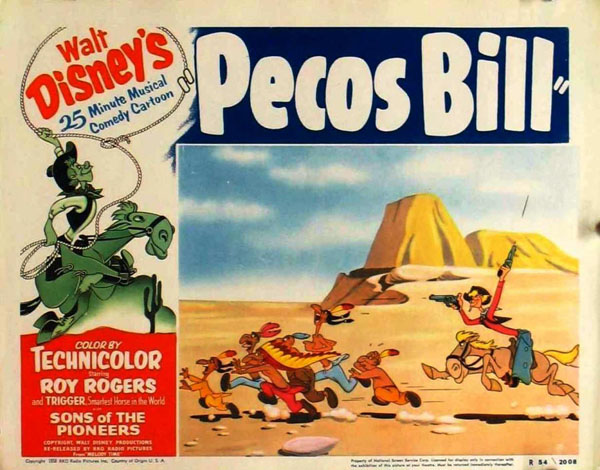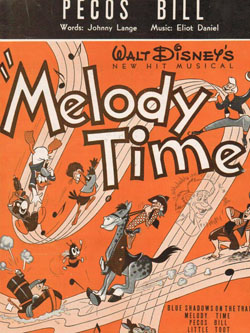
Even though the song “Pecos Bill” did not make the charts either at “Billboard” or at “Cash Box”, it sees to have gotten “covered” more widely than any other song from Melody Time.
The country market–still being called “hillbilly” in some circles–was well-covered by Roy Rogers’ version of the song, on which he and the Sons of the Pioneers pull out almost all the stops in order to put the song over. Roy sings. . . he yodels . . . about the only thing he doesn’t do is indulge in some square-dance calling (another of his talents).
 The “kiddie” market was also well-served by the story-teller set involving Rogers and the Sons. But that didn’t stop RCA Victor–and other firms–from putting out their own versions of the song.
The “kiddie” market was also well-served by the story-teller set involving Rogers and the Sons. But that didn’t stop RCA Victor–and other firms–from putting out their own versions of the song.
RCA called Sammy Kaye into their studios (just before the strike stared, no doubt), and had the Swing-and-Sway band to record “Pecos Bill” for the popular market. The Kaye disc–coupled with “Little Toot” on 20-2786–did not chart.
M-G-M, which had, in the space of one short year, achieved major-label status alongside RCA Victor, Columbia, Decca, Capitol, and another upstart label, Mercury, covered “Pecos Bill” with the Kings Men–a quartet we’ve met before (back when we were discussing The Reluctant Dragon). Like the Kaye biscuit, it was coupled with “Little Toot” (on 10179). And, like the Kaye disc, it did not chart.
Capitol tought that they could go after the country crowd that might buy Roy Rogers’ platter. They gave “Pecos Bill” to an artist who had just as much country “cred” as Rogers–perhaps even more so. They gave the song to Mauice Woodward “Tex” Ritter. Despite a citified, sophisticated upbringing, Ritter sounded like the genuine article all right. And he was accompanied by some of the West Coast’s top studio musicians. But his version did not make much of a dent in the sales of Roy Rogers’ version.
Smaller Majestic Records was about to give up operations. Seems that the firm’s owner was having trouble with three little letters: I R S. Just before the firm stopped operating entirely, they called a Midwestern band that could double in novelties and polkas. The recording by Captain Stubby and the Buccaneers cannot have been on the market for very long.
All this did not really help the music department at the Walt Disney Studios, or the folks at Santly-Joy Music–the Tin Pan Alley publisher who was handling Disney’s publishing in the days before Disney’s folks set up Wonderland Music.
But something was bound to happen–and it did in late 1948, and into early 1949.


 James Parten has overcome a congenital visual disability to be acknowledged as an expert on the early history of recorded sound. He has a Broadcasting Certificate (Radio Option) from Los Angeles Valley College, class of 1999. He has also been a fan of animated cartoons since childhood.
James Parten has overcome a congenital visual disability to be acknowledged as an expert on the early history of recorded sound. He has a Broadcasting Certificate (Radio Option) from Los Angeles Valley College, class of 1999. He has also been a fan of animated cartoons since childhood.










































To later generations, Tex Ritter was best known as narrator on various Disney projects, mostly episodes of The Wonderful World of Color about wild animals He also played narrator on Tex Avery’s “The First Bad Man”. And he’s the father of John Ritter and grandfather of Jason Ritter.
Tony – could you possibly be thinking of REX ALLEN as the narrator of so many Disney programs and films? He had such a warm, and relatable delivery!
I don’t associate TEX RITTER’s voice with much other than ‘Big Al’s’ song “Blood on the Saddle” in the Country Bear Jamboree show!
Yeah, I think you are thinking about Rex Allen for the Disney narration. Tex Ritter did indeed narrate The First Bad Man.
Recently, I was surprised that I forgot Ritter sang the theme for High Noon, remembering it wrongly as Frankie Laine.
The song figured in Disneyland’s Golden Horseshoe Revue, of course, with the lead performers a little improbably identified as Slue Foot Sue and (for the last number) Pecos Bill. I’ve also seen photos of signage indicating the animated segment played the Fantasyland Theater as a stand-alone short.
Maybe as a 60s kid I missed it, but I don’t remember Pecos Bill having any other presence in the Disney marketing universe. He’d seem to be a natural for comics or even additional shorts.
I remember watching “Pecos Bill” as one of the cartoons on the New Mickey Mouse Club in the ’70s. The ending made me sad.
“Pecos Bill” was also recorded by Dick Jurgens and His Orchestra on Columbia 38177.
I have to disagree with you about “Pecos Bill” being more heavily covered than any other song from MELODY TIME. “Blue Shadows on the Trail” clearly came out ahead, with recordings by Roy Rogers and the Sons of the Pioneers (RCA Victor 2780), Vaughn Monroe and His Orchestra (RCA Victor 2785), Bing Crosby (Decca 24433), Andy Russell (Capitol 15063), Gene Autry and the Melody Ranch Gang (Columbia 20448), Buddy Clark (Columbia 38170), Denny Dennis and the Keynotes (London 223), Foy Willing and His Trio (Majestic 6030), and Art Mooney and His Orchestra (MGM 10240).
That’s nine different recordings of “Blue Shadows” that were on the market during the release of MELODY TIME as opposed to only six versions of “Pecos Bill”: Roy Rogers and the Sons of the Pioneers (RCA Victor 2780), Sammy Kaye and His Orchestra (RCA Victor 2786), The King’s Men (MGM 10178), Tex Ritter (Capitol 40106), Captain Stubby and His Buccaneers (Majestic 1254), and Dick Jurgens (Columbia 38177)